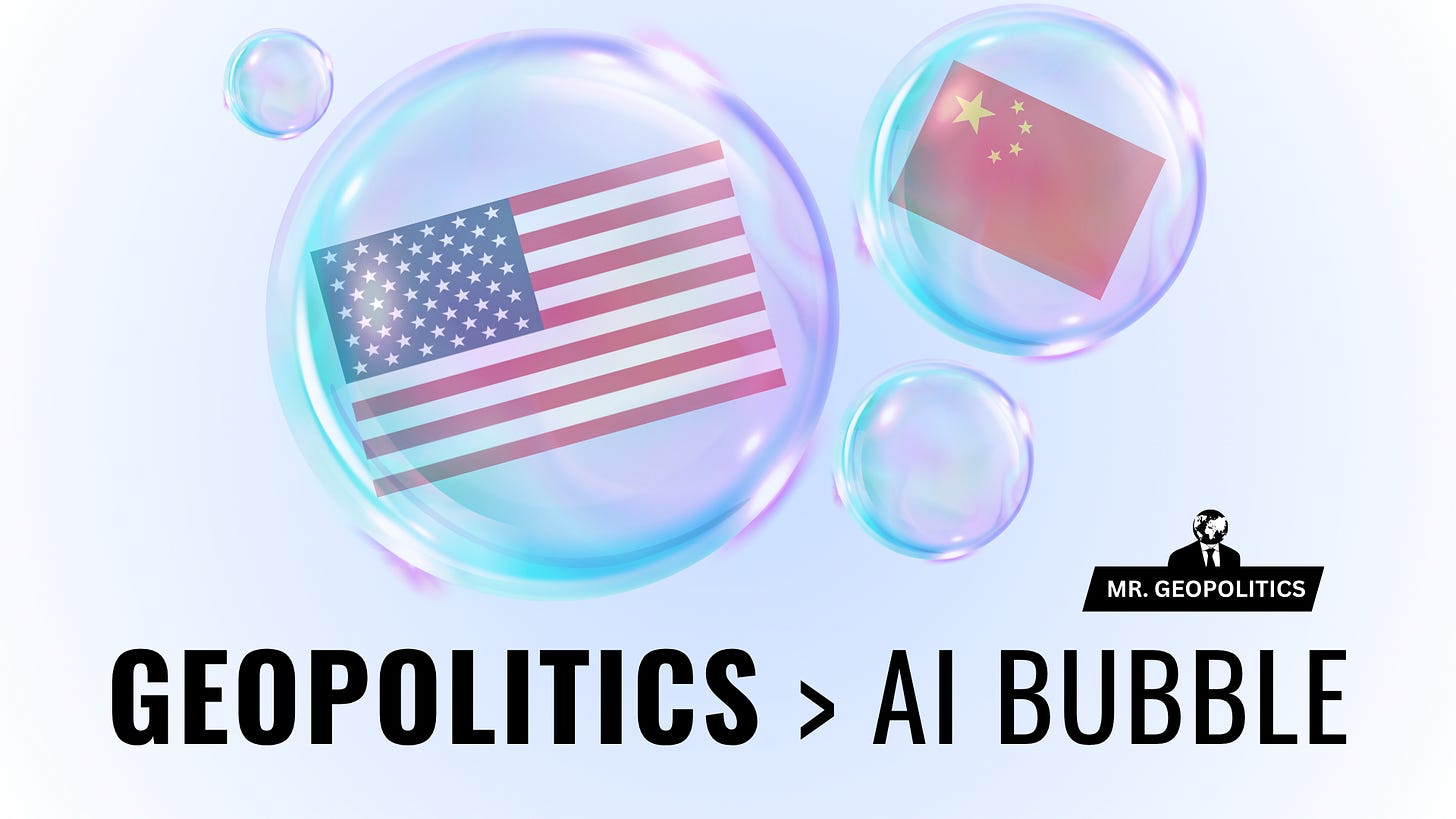The Geopolitics of An AI Bubble
Politics, not profit, will decide if the AI boom ends
…the US and its allies cannot allow the AI momentum to stop.
A couple of numbers reflect why AI bubble fears are exploding:
Last year, global corporate investment in AI was up 44%, jumping to $252.3 billion. That is 126 times Canada’s budget for AI sovereignty (up to $2 billion).
Since 2013, over $500 billion has been invested in US AI companies, compared to $75.7 billion in European and British firms (combined). In 2024, US private equity poured over $109.1 billion into AI companies, around 12 times what China spent ($9.3 billion).
Just around OpenAI, the latest deals with Oracle, Nvidia, and AMD mean there is a whopping $500 billion in play—three private deals within a single economy—almost two-thirds of the US defense budget.
New AI projects, like data centers, are more than mammoth. Stargate Norway, for example, has a 520MW target, meaning it will generate enough energy to power over 500,000 homes. Meanwhile, the UAE is investing up to €50 billion to build Europe’s largest AI data center in France, with a 1.4GW target. A single data center could power almost 1.5 million homes.
CLEAR IMBALANCES
Of course, many of the numbers are just on paper. But those data points also reveal clear imbalances. The US is drawing in a bulk of the world’s AI investment. This is a double-edged sword. While America’s AI leadership is rising, it is now the center of a global AI bubble that could pop at any moment. At the same time, private capital is underpinning America’s new AI renaissance, with no clear peak, changing how funds and private equity calculate exits, and the function of these stakeholders in the global economy.
If the AI bubble pops, so to speak, because of an AI controversy, a market correction, or an external event, like the US entering recession or the US-China fight disrupting investors, AI valuations could fall, and funding could be slashed in ways that cascade throughout the global economy, ending the current AI momentum. Or will it?
GEOPOLITICS > EVERYTHING
At the center of why an AI bubble may not pop, or even if it pops, it might not cause global havoc, is geopolitics. Put simply: the US and its allies cannot allow the AI momentum to stop.
If a bubble pops, innovation and deployment take a hit, as investors become bearish. This leads to three headaches:
Western ideas could turn to non-Western capital to fund AI innovation. British startups could seek Gulf capital if British investors are skittish, placing the UK’s AI ambitions in the hands of another nation. Of course, in this equation, China could also step in with capital.
American businesses will not be able to compete with Chinese AI firms that have limitless state support. If an AI bubble explodes, it could be Alibaba or Huawei signing the next major data center deals across the globe, not OpenAI. This, in turn, will exponentially increase China’s AI reach and power.
The US global technology footprint will fracture. The US needs to ramp up its AI deployments across the globe, from commercial to consumer, to reinforce its tech footprint. An AI bubble popping could push the world towards less-American offerings or “sovereign tech” (whatever that means).
The US and the West cannot allow any of this to happen.
WESTERN POSITION
An AI bubble is dependent on geopolitics.
The new status quo facing AI companies, investors, and innovators: the future of AI hinges on what is taking place on the world stage. The West, where an “AI bubble” may be largely concentrated, cannot allow AI growth to stop. None of this takes into account China or Arab states, where AI is being viewed as the new economic engine, making its continued development even more paramount for those governments.
Even if a market shift occurs and private investors pause, the government could step in/double down to ensure confidence and maintain the current momentum.
The geopolitical fallout of the AI bubble exploding is far too big. This reveals a stunning new reality: the AI world, only at the very beginning of its modern-day journey, is already too big to fail, but not just because of the economic catastrophe that would follow—but the geopolitical one too.
Much of this will be rejected by the brown-nosed investors or “fiscal entrepreneurs,” who continue to deny how geopolitics is moving and shaping markets. This means the only real choice is to wait and see. Eventually, something will disrupt the global AI sector. At that point, either it will all fall apart, or traditional business and economics will prevail.
Or, losses will be sustained and absorbed; state needs will offset private sentiment; and the threat of being outshone by an enemy will move money on a scale few can grasp.
-ABISHUR PRAKASH AKA. MR. GEOPOLITICS
Mr. Geopolitics is the property of Abishur Prakash/The Geopolitical Business, Inc., and is protected under Canadian Copyright Law. This includes, but is not limited to: ideas, perspectives, expressions, concepts, etc. Any use of the insights, including sharing or interpretation, partly or wholly, requires explicit written permission






